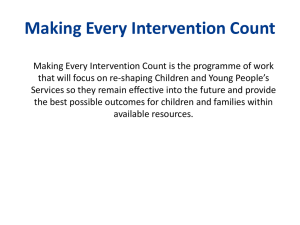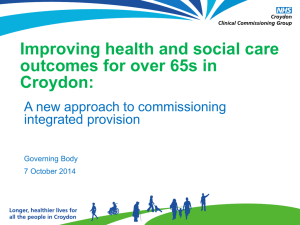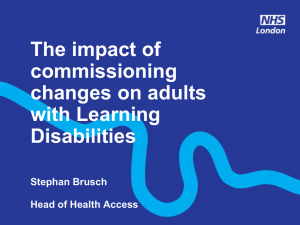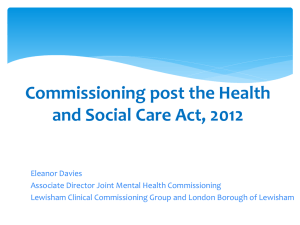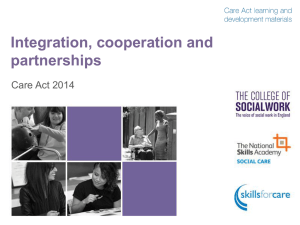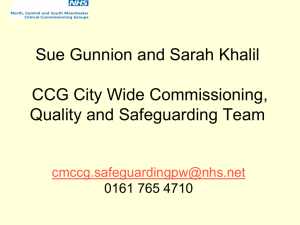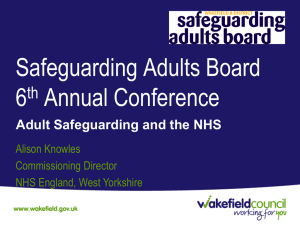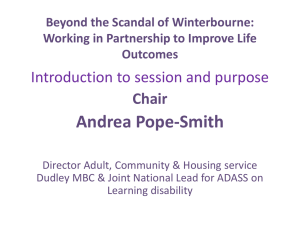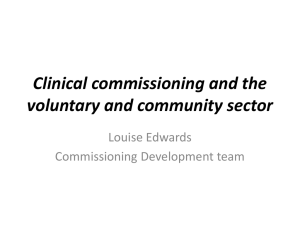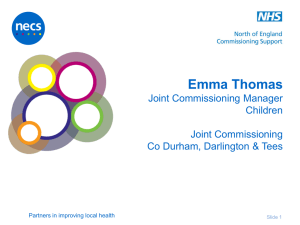Role of NHS England in safeguarding – Vikki Tweddle
advertisement
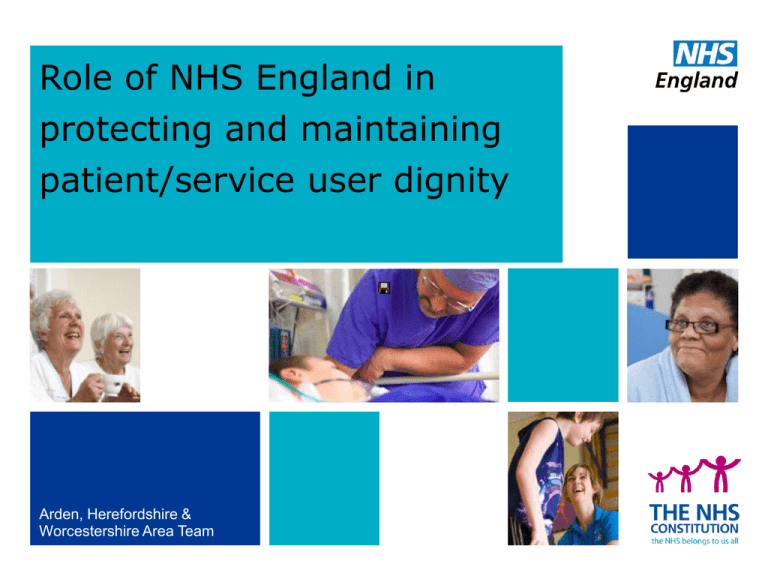
Role of NHS England in protecting and maintaining patient/service user dignity Arden, Herefordshire & Worcestershire Area Team Introduction: In April 2012, the Health and Social Care Bill passed its final hurdle. At the heart of the reforms were a radical restructuring of the health service in England, which came into beginning on 1st April 2013 http://vimeo.com/69224754 , explains the new structures within the NHS. The key message is that Health is not one organisation, rather it is made up of those who commission (buy) services, those that provide services and those that monitor services. Diagram 1 shows how those different organisations fit together. 2 PARLIAMENT Secretary of State and Department of Health Healthcare, Public Health, Adult Social Care Policy Mandate Outcomes Framework Framework Agreement Outcome Framework NHS England Local Authorities Public Health Adult Social care Local Accountability Health and Wellbeing Board Local Accountability Clinical Commissioning Groups NHS Care Framework Agreement Regulation Monitor Regulation 3 Eg. Equality and Diversity Council Clinical Senates and Networks C o n t r a c t s Framework Agreement Care Quality Commission Advise Challenge Regulation Providers NHS Trusts, PTI’s and other providers (VCS, Private Sector) CCG’s • In general, CCGs are responsible for commissioning health services to meet all the reasonable requirements of patient care, with the exception of: • Certain services commissioned directly by NHS England • Health improvement services commissioned by local authorities • Health protection and promotion services provided by Public Health England 4 NHS England NHS England is a commissioning organisation. Its key functions are: • Direct commissioning, • Supporting and assuring CCGs, and • Managing relationships with local stakeholders. • The NHS England is a single organisation, one national Board. There are different layers to NHS England but they act as one entity. 5 • There are National teams who lead of England wide initiatives as well as supporting the Area teams. • There are four Regions who operate as part of the national Operations Directorate, supporting the delivery of key business processes. • There are 27 Local Area Teams who carry out the above key functions. Direct commissioning includes GPs, Optometrists, Dentists, Pharmacists. It also includes some parts of Public health such as screening and health visiting. • In addition, there are some highly Specialised Commissioning Teams for high cost, low demand services. These teams work on behalf of the several Area teams. 6 The role of Area Teams in Safeguarding: • The Area Team has two distinct roles. It holds the CCGs to account for their Commissioning but also commissions itself. The region and national teams hold the Area team accountable for the Direct Commissioning. This is reflected in the overarching duties for safeguarding: • The NHS England Regional and Area Teams will each have a Director of Nursing who is responsible for supporting and providing assurance on the safeguarding of children and adults at risk of abuse or neglect. 7 Role (2) • The Area Team are statutorily responsible for ensuring that the organisations from which they commission services provide a safe system that safeguards children and adults at risk of abuse or neglect. This includes responsibilities for looked after children and for supporting the Child Death Overview process, to include sudden unexpected death in childhood. Local authorities have the same responsibilities in relation to the public health services that they commission. • The Area Team have a statutory duty to be members of Local Safeguarding Children Boards (LSCBs) and are expected to be fully engaged with local Safeguarding Adults Boards (SABs). 8 Role (3) • The Area Team should ensure that robust processes are in place to learn lessons from cases where children or adults die or are seriously harmed and abuse or neglect is suspected. This will include contributing fully to Serious Case Reviews (SCRs) and also, where appropriate, conducting individual management reviews. • The Area Team is responsible for ensuring that the health commissioning system as a whole is working effectively to safeguard and improve the outcomes for children and adults at risk and their families. It provides oversight and assurance of CCG safeguarding arrangements and supports CCGs in meeting their responsibilities. This includes working with the Care Quality Commission (CQC), professional regulatory bodies and other national partners. 9 Role (4) • The Area Team and CCGs will work closely together, and, with local authorities, LSCBs and SABs, to ensure there are effective NHS safeguarding arrangements across each local health community, whilst at the same time ensuring absolute clarity about the underlying statutory responsibilities that each commissioner has for the services that they commission, together with a clear leadership and oversight role for the Area Team. • The Area Team needs to have the capacity to develop it’s safeguarding responsibilities and support CCGs. CCGs may wish to approach their Area Team for additional advice. 10 Secondary care assurance • QSG • Contract monitoring • Dashboard • Training compliance • Safeguarding forum 11 Primary care assurance • Training • Designated nurse and named doctor • Safeguarding lead in each practice • PLDP processes • Complaints • FFT 12

